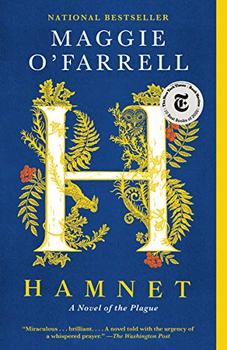Summary | Excerpt | Reviews | Beyond the book | Read-Alikes | Genres & Themes | Author Bio

A William Shakespeare Mystery
by Benet BrandrethBenet Brandreth's delightfully diverting historical thriller brings the Bard to vibrant life. Even though I am far from a Shakespeare scholar, I thoroughly enjoyed spotting the allusions to themes that the young protagonist would later explore via his plays. Add to that Brandreth's genius idea of filling Shakespeare's so-called "missing years"* with villainy, adultery, scandal and intrigue and this book climbs to the top of my list of the year's favorite reads.
The Spy of Venice begins in 1585 when William, at twenty, already has a wife, Anne, and three children. Living with his parents, the couple seems happy enough, though the restless young man does regret the mandatory marriage that resulted from one moment's pleasure with the decidedly older woman. Where he is all barely-harnessed energy and mischief, Anne is characterized as perfectly content with home and hearth. Indeed, when the fair comes to town and Will seeks her permission to attend the play she asks, "Will you be drunk again?" "Again?" he replies. "I am never drunk, Wife. Though I grant I am prone to periods of great wit followed by deep sleep." Ultimately, she seems happy to have him out of the house as he's almost as childish as their two-year-old daughter, Susanna.
At the fair, William treats a troupe of traveling thespians to a jug of wine and, in exchange, they regale him with stories of their lives and travels. He is clearly enamored with the ethos of the theater – he loves the acting and he especially loves the words. He fancies himself something of a poet and, ultimately, submits a short theatrical piece for the troupe to perform. It's a piece intended to woo the daughter of a local politician. On his first encounter with her, "he managed to look contrite and wolfish at the same time. It was a combination he had had occasion to master. He was rewarded with a smile from the girl."
William's advances yield a much greater reward later on in the girl's bed. But he is identified in his early morning escape and the politician - unwilling to name the actual violation - accuses him of poaching, swearing retribution on both William and his upstanding father. He and his family decide that he needs to make himself scarce. So he takes off for London, promising to write and send money.
London isn't welcoming, and the only job William can land is cleaning stables. But, as luck would have it, he once again encounters the traveling players and resumes his friendship with two of the principles, Nicholas Oldcastle and John Hemminges. Through them he becomes acquainted with a knight, Sir Henry, who hires Will to write a love poem for him. It is his first professional writing job and Shakespeare finds himself in a state every writer can relate to. "When his poetry had been for his pleasure alone, it flowed from him freely. Writing for another seemed to dam the river." He overcomes the temporary block and receives another commission from Sir Henry, which leads to William getting beaten up – which leads to Sir Henry hiring the players, including Shakespeare, to accompany him on a mission for the Queen, to Venice.
Turns out Sir Henry is a spy assigned to deliver a letter to the Doge of Venice proposing an alliance against Spain, the Netherlands, the Catholic Church and everyone else bent on destroying England. His plan includes using the naive William in a risky scheme. But en route, the traveling embassy is beset by murderers who leave only Shakespeare and Oldcastle alive. Sir Henry turns the letter over to William with instructions to personally hand deliver it to the Doge. With Oldcastle posing as Sir Henry and William as his man, the pair embark on the adventure of young Will's life in Venice.
Rapturous Venice proves to be every bit as beautiful, sexy, dangerous and exhilarating as anyone ever imagined. And William gets thoroughly caught up in the intrigue. The young wordsmith is completely up to the task at hand despite his naïveté in matters of state. Rubbing shoulders with nobles, felons, courtesans and killers – sometimes all in one body – rapidly baptizes the quick-witted Will in the arts of duplicity and villainy.
From the very structure of this book – as a play in five acts with interludes, prologue and epilogue – to the prose and dialogue so true to the 16th century, to The Spy of Venice's intricate plot, I believe that Brandreth does Shakespeare proud.
![]() This review was originally published in The BookBrowse Review in August 2018, and has been updated for the
January 2020 edition.
Click here to go to this issue.
This review was originally published in The BookBrowse Review in August 2018, and has been updated for the
January 2020 edition.
Click here to go to this issue.

If you liked The Spy of Venice, try these:

by Maggie O'Farrell
Published 2021
"Of all the stories that argue and speculate about Shakespeare's life … here is a novel … so gorgeously written that it transports you." —The Boston Globe

by S.D. Sykes
Published 2016
In this chilling historical mystery, young girls go missing from a medieval English village and Lord Oswald de Lacy must find the killer before tragedy strikes again.
Your guide toexceptional books
BookBrowse seeks out and recommends the best in contemporary fiction and nonfiction—books that not only engage and entertain but also deepen our understanding of ourselves and the world around us.